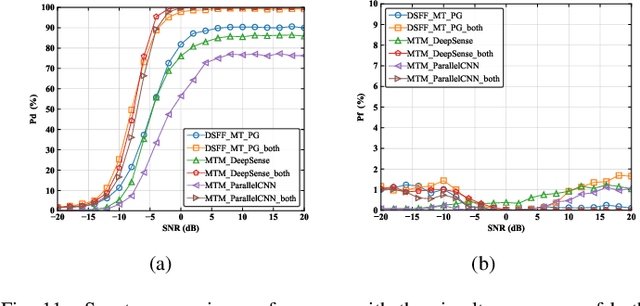Zhijin Zhao
T-ADD: Enhancing DOA Estimation Robustness Against Adversarial Attacks
Dec 11, 2025Abstract:Deep learning has achieved remarkable success in direction-of-arrival (DOA) estimation. However, recent studies have shown that adversarial perturbations can severely compromise the performance of such models. To address this vulnerability, we propose Transformer-based Adversarial Defense for DOA estimation (T-ADD), a transformer-based defense method designed to counter adversarial attacks. To achieve a balance between robustness and estimation accuracy, we formulate the adversarial defense as a joint reconstruction task and introduce a tailored joint loss function. Experimental results demonstrate that, compared with three state-of-the-art adversarial defense methods, the proposed T-ADD significantly mitigates the adverse effects of widely used adversarial attacks, leading to notable improvements in the adversarial robustness of the DOA model.
DS-Pnet: FM-Based Positioning via Downsampling
Apr 10, 2025



Abstract:In this paper we present DS-Pnet, a novel framework for FM signal-based positioning that addresses the challenges of high computational complexity and limited deployment in resource-constrained environments. Two downsampling methods-IQ signal downsampling and time-frequency representation downsampling-are proposed to reduce data dimensionality while preserving critical positioning features. By integrating with the lightweight MobileViT-XS neural network, the framework achieves high positioning accuracy with significantly reduced computational demands. Experiments on real-world FM signal datasets demonstrate that DS-Pnet achieves superior performance in both indoor and outdoor scenarios, with space and time complexity reductions of approximately 87% and 99.5%, respectively, compared to an existing method, FM-Pnet. Despite the high compression, DS-Pnet maintains robust positioning accuracy, offering an optimal balance between efficiency and precision.
WK-Pnet: FM-Based Positioning via Wavelet Packet Decomposition and Knowledge Distillation
Apr 10, 2025



Abstract:Accurate and efficient positioning in complex environments is critical for applications where traditional satellite-based systems face limitations, such as indoors or urban canyons. This paper introduces WK-Pnet, an FM-based indoor positioning framework that combines wavelet packet decomposition (WPD) and knowledge distillation. WK-Pnet leverages WPD to extract rich time-frequency features from FM signals, which are then processed by a deep learning model for precise position estimation. To address computational demands, we employ knowledge distillation, transferring insights from a high-capacity model to a streamlined student model, achieving substantial reductions in complexity without sacrificing accuracy. Experimental results across diverse environments validate WK-Pnet's superior positioning accuracy and lower computational requirements, making it a viable solution for positioning in real-time resource-constraint applications.
Deep Learning-Based Wideband Spectrum Sensing with Dual-Representation Inputs and Subband Shuffling Augmentation
Apr 10, 2025



Abstract:The widespread adoption of mobile communication technology has led to a severe shortage of spectrum resources, driving the development of cognitive radio technologies aimed at improving spectrum utilization, with spectrum sensing being the key enabler. This paper presents a novel deep learning-based wideband spectrum sensing framework that leverages multi-taper power spectral inputs to achieve high-precision and sample-efficient sensing. To enhance sensing accuracy, we incorporate a feature fusion strategy that combines multiple power spectrum representations. To tackle the challenge of limited sample sizes, we propose two data augmentation techniques designed to expand the training set and improve the network's detection probability. Comprehensive simulation results demonstrate that our method outperforms existing approaches, particularly in low signal-to-noise ratio conditions, achieving higher detection probabilities and lower false alarm rates. The method also exhibits strong robustness across various scenarios, highlighting its significant potential for practical applications in wireless communication systems.
 Add to Chrome
Add to Chrome Add to Firefox
Add to Firefox Add to Edge
Add to Edge